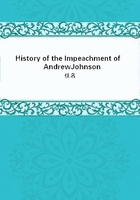
第19章 MR. JOHNSON'S ACCESSION TO THE PRESIDENCY.(6)
The State of Virginia being so accessible to Washington City, and information from this quarter therefore being readily obtained, Ihastened through the State without conversing or meeting with any of its citizens. In Raleigh, North Carolina, I spent one day; in Charleston, South Carolina, I spent two days; Savannah and Augusta, Georgia, each one day. Both in traveling and while stopping, I saw much and conversed freely with the citizens of those States, as well as with officers of the Army who have been stationed among them. The following are the conclusions come to by me:
I am satisfied that the mass of the thinking men of the South accept the present situation of affairs in good faith. The questions which have heretofore divided the sentiments of the people of the two sections--Slavery and State Rights, or the right of a State to secede from the Union--they regard as having been settled forever by the highest tribunal--arms--that man can resort to. I was pleased to learn from the leading men whom Imet, that they not only accepted the decision arrived at, as final, but that now, when the smoke of battle has cleared away, and time has been given for reflection, this decision has been a fortunate one for the whole country, they receiving like benefits from it with those who opposed them in the field and in council.
Four years of war, during which law was executed only at the point of the bayonet throughout the States in rebellion, have left the people possibly in a condition not to yield that ready obedience to civil authority the American people have been in the habit of generally yielding. This would render the presence of small garrisons throughout those States necessary until such time as labor returns to its proper channels and civil authority is fully established. I did not meet anyone, either those holding places under the Government or citizens of the Southern States, who think it practicable to withdraw the Military from the South at present. The white and black mutually require the protection of the General Government. There is such universal acquiescence in the authority of the General Government throughout the portions of the country visited by me, that the mere presence of a military force, without regard to numbers, is sufficient to maintain order. The good of the country and economy require that the force kept in the interior where there are many freedmen (elsewhere in the Southern States than at forts upon the sea coast, no more is necessary,) should all be white troops. The reasons for this are obvious without mentioning any of them. The presence of black troops, lately slaves, demoralizes labor both by their advice and by furnishing in their camps a resort for freedmen for long distances around. White troops generally excite no opposition, and therefore a small number of them can maintain order in a given district. Colored troops must be kept in bodies sufficient to defend themselves. It is not thinking men who would use violence towards any class of troops sent among them by the General Government, but the ignorant in some cases might, and the late slave seems to be imbued with the idea that the property of his late master should of right belong to him, or at least should have no protection from the colored soldiers. There is danger of collision being brought on by such causes.
My observations lead me to the conclusion that the citizens of the Southern States are anxious to return to self government within the Union as soon as possible; that while reconstructing they want and require protection from the Government; that they are in earnest in wishing to do what they think is required by the Government, not humiliating to them as citizens, and that if such is pointed out they would pursue it in good faith. It is to be regretted that there cannot be a greater commingling at this time between the citizens of the two sections, and particularly with THOSE ENTRUSTED WITH THE LAWMAKING POWER.
I did not give, the operation of the Freedmen's Bureau that attention I would have done if more time had been at my disposal.